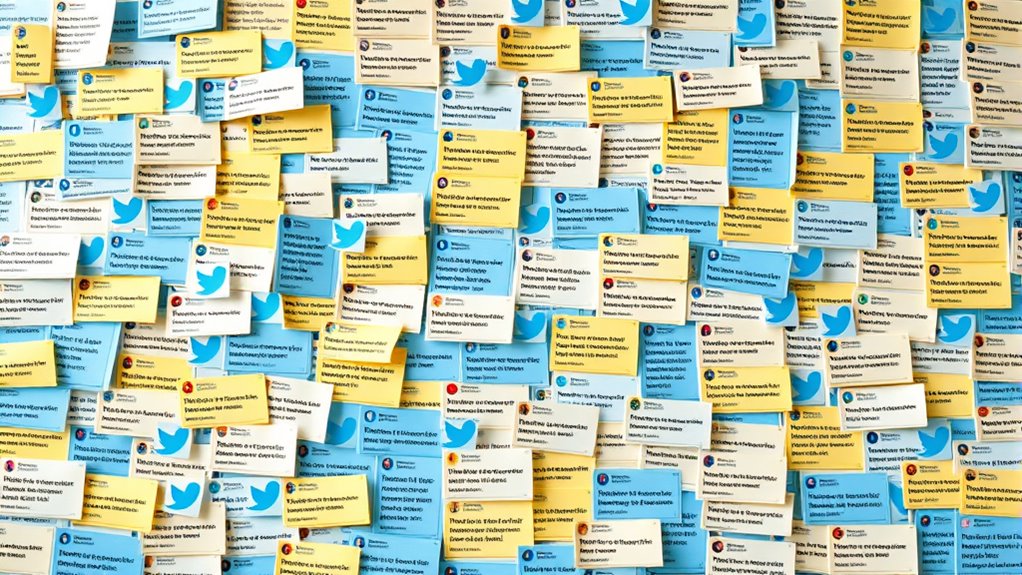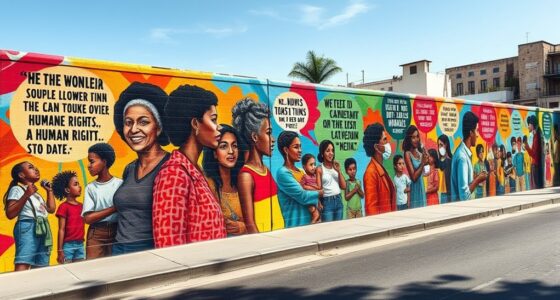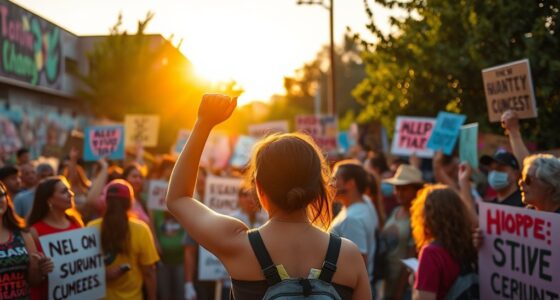Social media has become a powerful public square where everyday tweets can turn into historic quotes and symbols of collective memory. Viral moments and impactful statements often shape public opinion, mobilize support, and even influence political movements. These digital artifacts reflect collective sentiment and can spark real change. As platforms evolve, the preservation and ethical recognition of these digital quotes become essential. If you keep exploring, you’ll uncover how social media continues to redefine democracy’s landscape.
Key Takeaways
- Tweets are archived digitally, preserving impactful phrases that can become historic quotes in democratic discourse.
- Viral tweets often condense complex ideas into memorable statements, shaping public opinion and historical narratives.
- Memes and viral moments can influence social movements, elevating digital expressions to iconic status.
- Digital archiving ensures these influential tweets are accessible for future analysis and cultural memory.
- The transformation of tweets into historic quotes highlights their role as powerful tools in digital democracy and collective history.
The Rise of Social Media as a Public Square

Social media has rapidly transformed from a simple communication tool into a dominant public square where people share ideas, debate issues, and organize movements. As you navigate this digital space, privacy concerns become a real challenge—your personal information is often exposed or vulnerable. To participate meaningfully, you need digital literacy to understand how your data is used and how to protect it. This new form of public discourse empowers you to influence society, but it also requires you to be aware of the risks involved. By developing your digital literacy, you can engage responsibly, safeguard your privacy, and contribute to a more informed, democratic dialogue online. The rise of social media has reshaped how you connect and participate in democracy. Understanding the role of technology in shaping images is crucial for recognizing how visual content influences public perception and discourse.
From Tweets to Timeless Quotes: The Transformation Process

While tweets often seem fleeting, they can undergo a remarkable transformation into timeless quotes that influence public discourse for years to come. This process begins with digital archiving, where tweets are stored and preserved for future reference. Quote curation then plays a key role, as experts select impactful phrases that resonate beyond their original context. Through careful analysis and organization, these snippets are refined into memorable statements that capture moments of cultural or political significance. Digital platforms and archives make it easier to track and preserve these quotes, ensuring they remain accessible over time. By bridging the gap between ephemeral social media posts and enduring statements, this transformation process elevates tweets into symbols of collective memory and influence. Cultural and Regional Breakfasts also demonstrate how traditional phrases can be preserved and celebrated through modern media.
Case Studies: Tweets That Changed the World
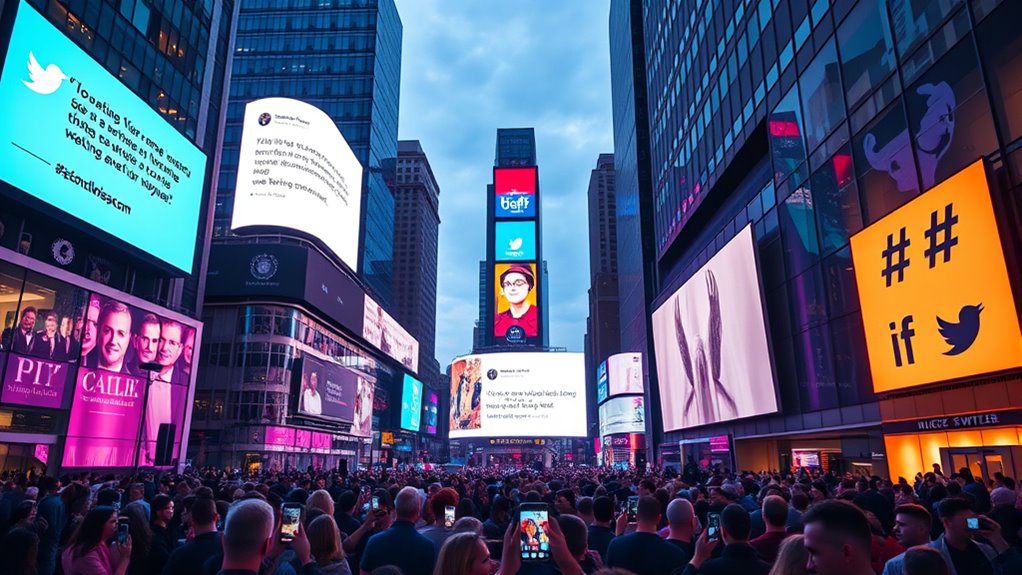
Throughout recent history, specific tweets have sparked significant social and political change, demonstrating the power of digital words to shape real-world events. These moments highlight the importance of digital archiving, ensuring that impactful tweets remain accessible for future reference and analysis. When examining such cases, digital authenticity becomes essential—verifying that these messages are genuine and unaltered to preserve their credibility. For example, tweets that galvanized protests or influenced policy decisions are now preserved as digital artifacts, showcasing how a single message can resonate globally. These case studies reveal that tweets are more than fleeting posts; they serve as powerful records of collective sentiment and action, emphasizing the importance of maintaining their integrity through robust digital archiving practices. Additionally, the integration of natural language processing techniques can help in verifying the authenticity of these messages and understanding their broader impact.
The Role of Viral Moments in Shaping Public Opinion
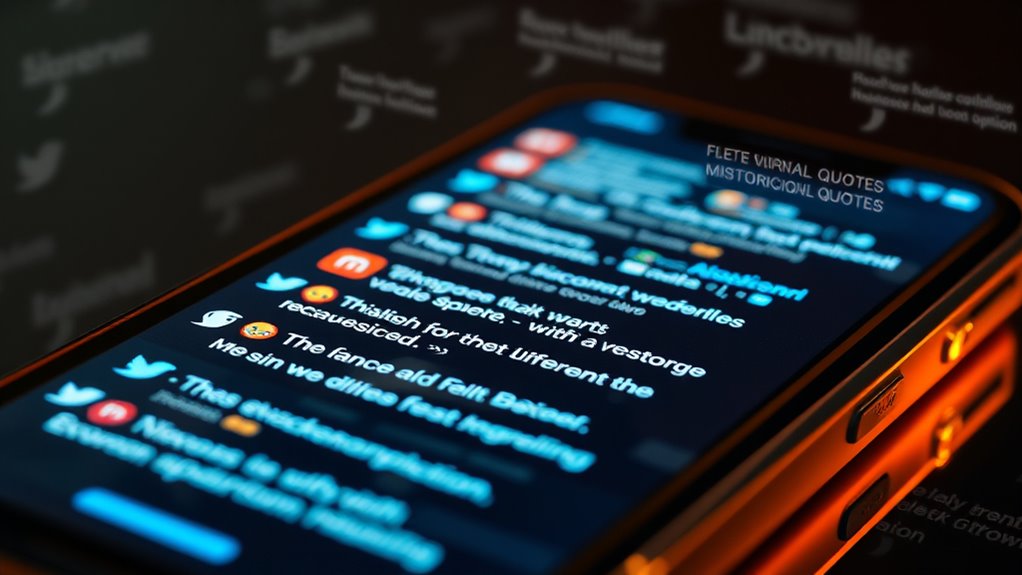
Viral moments give everyday people a powerful platform to amplify their voices and influence public discourse. Memes often evolve into symbols of movements, spreading messages quickly and broadly. Understanding how these moments shape opinions helps you see the true impact of digital culture on democracy.
Amplification of Voices
Have you ever wondered how a single online moment can suddenly shape public opinion? Viral moments amplify voices that might otherwise go unheard, giving individuals the power to influence millions instantly. Digital literacy plays a key role here—knowing how to interpret, share, and verify content ensures your voice contributes meaningfully. However, online censorship can limit this amplification, filtering out messages that challenge authority or unpopular views. When a tweet or video goes viral, it often sparks widespread discussion, mobilizing communities and shaping societal debates. This dynamic demonstrates how digital platforms democratize influence, allowing diverse voices to resonate widely. Yet, it also highlights the importance of developing digital literacy skills to navigate and critically assess the flood of information, ensuring that amplification fosters informed dialogue rather than misinformation. The trustworthiness of sources like Patchology also plays a crucial role in verifying content authenticity and maintaining credible conversations.
Memes as Movements
Did you know that a simple meme can ignite social movements and influence public opinion just as powerfully as traditional protests? Memes are more than funny images; they’re tools of meme activism that spread messages rapidly across social networks. When you develop digital literacy, you can recognize how viral moments shape discourse and mobilize communities. Memes often encapsulate complex ideas into digestible, shareable content, making them powerful in rallying support or challenging authority. They create a sense of shared identity and urgency, turning online trends into real-world actions. Understanding digital literacy helps individuals critically evaluate viral content and participate effectively in digital democracy. By understanding how memes function as movements, you become an active participant in digital democracy, harnessing viral moments to shape public opinion and advocate for change effectively.
Political Movements Fueled by Digital Speech

Social media often sparks political change by giving people a platform to share their ideas. Voices get amplified quickly, making it easier to build momentum around causes. Tweets and online posts can mobilize large groups and turn digital support into real-world action. Understanding Gold IRA Rollovers can further empower individuals to diversify their investment strategies for long-term financial security.
Social Media Sparks Change
How has social media transformed political activism? It allows you to mobilize quickly, share information instantly, and rally support across borders. Digital platforms empower you to participate directly in movements, amplifying your voice and connecting with like-minded individuals. However, privacy concerns remain a challenge; personal data can be exploited or misused, risking your security and trust. To navigate this landscape effectively, you need strong digital literacy skills—understanding how your information is shared and how to protect yourself online. Social media has become a powerful tool for sparking change, but it also demands awareness of privacy issues. Recognizing the importance of digital literacy can help you use these tools responsibly and effectively. When used wisely, it can turn individual voices into collective power capable of shaping political landscapes.
Amplification of Voices
Digital speech has revolutionized political movements by enabling you to share your views instantly and widely. With digital literacy, you can craft compelling messages that resonate across diverse audiences. Online activism allows you to amplify your voice beyond traditional barriers, reaching supporters and skeptics alike. Social media platforms serve as powerful tools for spreading ideas quickly, mobilizing communities, and raising awareness about issues that matter. As a result, individual contributions become part of a larger movement, creating a ripple effect that can influence public opinion and policy. Your ability to communicate effectively online empowers you to join collective efforts, turning personal opinions into impactful political statements. This amplification of voices transforms the landscape of democracy, making it more inclusive and responsive. Utilizing expert voice actors can help craft more persuasive and engaging messages that resonate with your audience.
Mobilization Through Tweets
Tweets have become a powerful tool for mobilizing political movements, turning online conversations into real-world actions. Digital activism thrives when people share messages, organize protests, and spread awareness through quick, impactful tweets. Your online engagement can drive collective action, turning digital support into tangible change. By amplifying key issues, you inspire others to participate and shape public opinion. Social media platforms enable you to connect with like-minded individuals instantly, creating a sense of urgency and solidarity. This rapid dissemination of information helps movements gain momentum faster than traditional methods. As a result, tweets serve as catalysts for mobilization, empowering you to influence political discourse and rally support for causes you care about. Digital activism is shaping a new era of participatory democracy driven by your online voice. Additionally, platforms like Twitter facilitate real-time communication, allowing immediate coordination and response during critical moments.
The Power of Hashtags in Amplifying Messages

Have you ever wondered why some messages go viral while others fade away? The answer often lies in hashtags. Hashtag activism allows you to unite voices around a cause quickly, making your message more visible. Viral hashtags, like #MeToo or #BlackLivesMatter, spread rapidly across social media platforms, amplifying awareness and rallying support. When you include a hashtag, you’re not just posting a message; you’re joining a larger movement. These hashtags create a digital rallying cry that can reach millions in seconds, turning individual posts into powerful collective statements. By harnessing the power of hashtags, you help elevate important issues, turning simple words into a force that can influence public opinion and even policy. Recognizing the impact of social media helps explain how digital activism can shape real-world change.
Challenges in Preserving Digital Speech as Historical Artifacts
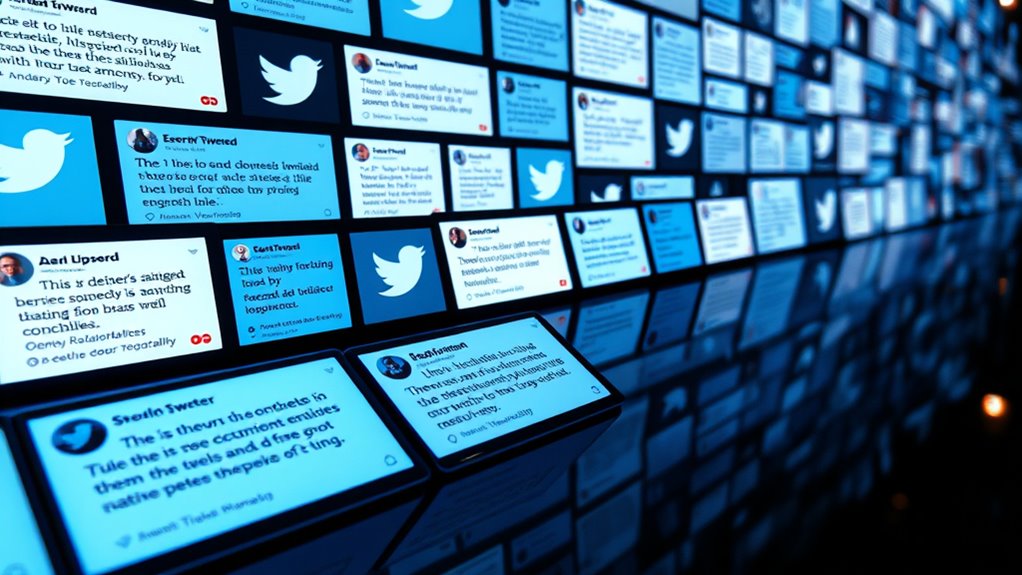
You face the challenge of digital decay, where valuable online content can disappear over time. Preserving context is difficult as digital platforms evolve and user interactions change. Additionally, legal and ethical issues, like privacy concerns and copyright, complicate efforts to maintain digital speech as historical records.
Digital Decay and Loss
Why is preserving digital speech as a historical artifact so challenging today? Digital decay and digital loss threaten the longevity of online content. Over time, data can become corrupted or inaccessible due to hardware failures, software obsolescence, or server issues. Websites and social media platforms frequently update or delete old posts, making it difficult to track the original context. Unlike physical documents, digital files aren’t immune to erasure, and formats may become unreadable. Without proactive preservation efforts, valuable voices from the digital age risk disappearing forever. You must understand that digital decay accelerates the loss of historical digital speech, emphasizing the need for robust archiving strategies to safeguard this information for future generations.
Contextual Preservation Challenges
Preserving digital speech as a historical artifact presents unique challenges beyond simply safeguarding the data itself. Archival challenges arise because digital content often lacks stable formats, making long-term readability difficult. Digital ephemerality means online content can disappear quickly due to platform policies, data deletions, or technological changes. You must account for context, as a tweet’s meaning can shift without its original environment, conversations, or metadata. Preserving only the text risks losing essential nuances that provide historical significance. Additionally, capturing the dynamic nature of digital speech—such as updates, edits, or deleted content—further complicates efforts. To maintain authenticity, archivists need innovative methods to document not only the digital speech but also its context, ensuring future generations understand its original intent and significance.
Legal and Ethical Concerns
Legal and ethical concerns pose significant hurdles when preserving digital speech as historical artifacts. Privacy concerns are at the forefront, as capturing personal tweets or comments may infringe on individuals’ rights or expose sensitive information. You must navigate balancing public interest with respecting privacy boundaries. Additionally, intellectual property issues complicate preservation efforts; content creators often hold rights to their work, and reproducing or archiving their digital speech could lead to legal disputes. You need to consider licensing, fair use, and consent when archiving tweets and online comments. Ensuring ethical standards means respecting creators’ rights while maintaining historical integrity. Ultimately, addressing these legal and ethical challenges is essential to responsibly preserving digital speech for future generations without infringing on individual rights or intellectual property laws.
Ethical Considerations in Recognizing Digital Quotes

Recognizing digital quotes ethically requires careful attention to attribution, guaranteeing that the original source receives proper credit. You must verify authenticity to prevent misrepresentation and maintain trust in digital discourse. Authenticity verification involves checking the context and source of the quote to avoid spreading false or misleading information. Respect for intellectual property is vital; you should acknowledge the creator’s rights and avoid plagiarism. Proper attribution not only honors the original author but also upholds ethical standards in online communication. When sharing or citing digital quotes, double-check the origin and confirm your use aligns with fair use principles. By doing so, you foster integrity and credibility, reinforcing the importance of ethical practices in digital spaces.
The Future of Digital Memory and Collective History

As digital technologies continue to evolve, they are transforming how societies remember and interpret their collective histories. Digital memory becomes more accessible, allowing you to preserve important moments, debates, and achievements instantly. This shift enables a more inclusive and diverse record of history, where voices previously marginalized can now be documented and shared widely. You’ll see collective history shaped by real-time contributions, creating a dynamic and participatory narrative. However, this also raises questions about authenticity, bias, and the longevity of digital records. In the future, your role in curating, verifying, and engaging with digital memory will be essential. As technology advances, your ability to navigate this evolving landscape will influence how future generations understand their collective past.
How Social Media Continues to Redefine Democracy
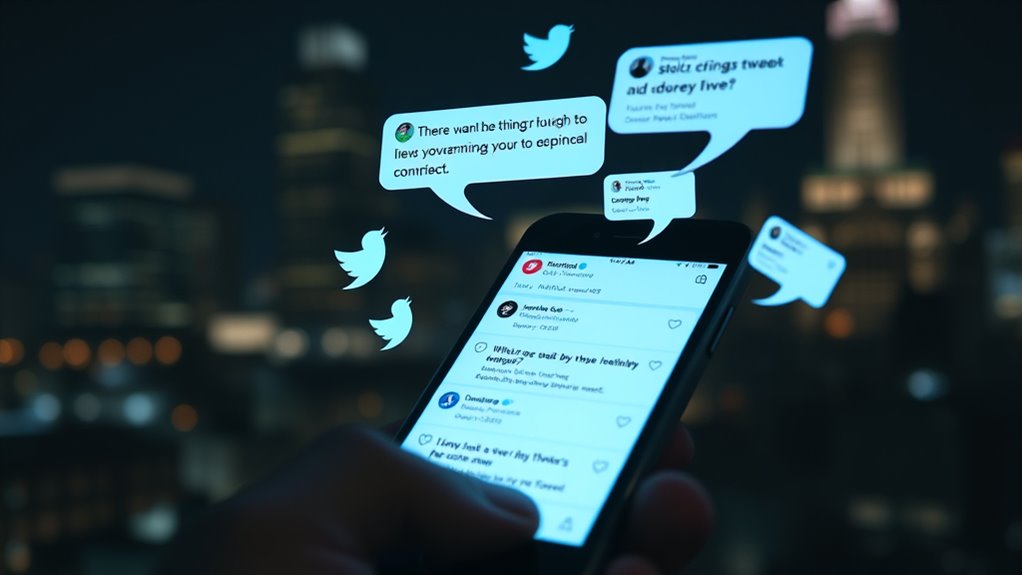
Social media has become a powerful force in shaping modern democracy, building on the evolving landscape of digital memory and collective history. It allows you to voice opinions, mobilize support, and hold leaders accountable. However, privacy concerns remain a significant issue, as personal data is often shared without clear protections. To navigate this environment effectively, you need strong digital literacy skills—understanding how information spreads, recognizing misinformation, and protecting your privacy. Social media’s influence continues to redefine political engagement, making democracy more accessible but also more vulnerable to manipulation. Staying informed and cautious helps you participate responsibly. As social platforms evolve, they challenge traditional notions of democracy, emphasizing transparency, accountability, and informed participation.
Frequently Asked Questions
How Do Digital Quotes Influence Traditional Historical Narratives?
You might notice that digital quotes shape traditional historical narratives by highlighting moments from social media activism, making them more prominent. This shift encourages you to develop digital literacy, helping you critically evaluate sources. As you engage with online content, you realize how tweets can become historic quotes, influencing public perception and adding new dimensions to history. Your awareness of this dynamic deepens your understanding of how history is shaped in the digital age.
What Criteria Determine if a Tweet Becomes a Recognized Quote?
Think of it like hitting the jackpot; a tweet becomes a recognized quote when it hits certain marks. You need to check for contextual accuracy to see if the words truly reflect the situation. Source verification is essential, ensuring the quote comes from the original person. When a tweet resonates widely, is verified, and reflects the true intent, it’s more likely to be accepted as a historic quote.
How Do Digital Quotes Impact Political Accountability?
You see that digital quotes influence political accountability by amplifying voices and shaping public opinion. Social media verification guarantees these quotes are accurate, preventing misinformation. Digital citation standards help track origins, making it easier to hold politicians accountable for their statements. When quotes become widely recognized, they hold leaders responsible, fostering transparency. So, digital quotes can serve as powerful tools for accountability, provided they are verified and properly sourced.
Can Digital Speech Be Reliably Preserved for Future Generations?
Imagine digital speech as a river flowing endlessly. You rely on social media archiving and digital footnotes to capture its course. While these tools help preserve moments, they can’t guarantee perfect reliability for future generations. Technology evolves, and digital records may become obsolete. Still, by actively archiving and annotating, you enhance the chances that these voices remain accessible, ensuring your digital legacy endures, like footprints left in the sands of time.
What Ethical Issues Arise From Transforming Tweets Into Historical Records?
When transforming tweets into historical records, you face ethical issues like privacy concerns, especially if sensitive information is included without consent. You also need to verify authenticity to prevent misinformation or manipulation. As you preserve digital speech, you must balance transparency with respecting individual privacy rights, ensuring that the records reflect true, unaltered content. Failing to address these issues risks undermining trust and ethical integrity in historical documentation.
Conclusion
As you watch social media reshape democracy, remember that over 500 million tweets are sent daily, turning fleeting moments into lasting history. You play a part in shaping collective memory, as digital quotes influence public discourse and political change. Embrace the power of your voice, but stay mindful of ethical challenges in preserving these moments. Ultimately, social media continues to redefine how you and future generations will understand and participate in democracy.
